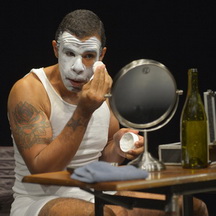Top Girls is tops at Shotgun Players
A dinner party for dead people. That’s what initiates noted British playwright Caryl Churchill’s 1982 Top Girls, now in a watchable revival by Berkeley’s Shotgun Players. The five guests are all women with firm places in history, legend or art, though none is widely known. Two are decidedly real: the nervy 19th century world traveler, Isabella Bird, and the 11th century Japanese concubine, Lady Nijo. Two are creations of art: Patient Griselda, who appears in Chaucer’s Canterbury Tales, and Dull Gret (Mad Mag) a prominent figure in a Brueghel painting. The fifth may or may not be real: the 7th century Pope Joan, the only woman Pope, who reigned by disguising her sex, which came to light only when she gave birth, after which she was stoned to death.
Oh, and there’s a 6th guest, an ambitious woman from the Thatcher era named Marlene, who has just been promoted to top girl at the Top Girls Employment Agency in London. The six have gathered to celebrate her achievement of a position a male employee expected to get. What success!
They’ve also gathered so Churchill can introduce themes she develops further in acts two and three. Those themes are feminist in nature: the second-class position of a woman in “a man’s world,” and how that position affects what she has to do to succeed and how she has to negotiate other aspects of her life: fathers, men, and children.
A child, as the play demonstrates, can be a joy but, to a woman who wants to get ahead, it can also be a burden. If she has one and she’s, as Marlene describes herself, “pushy,” should she keep it?
Acts two and three take place in the Top Girls office, where we watch the sexual politics of the era play out in interviews with potential clients, in water-cooler gab-fests, and especially in a tense encounter with the angry wife of the guy who got passed over for the job Marlene got. The other setting is the drab home of Marlene’s sister, Joyce, whose troubled teen-aged daughter, Angie, is so intensely drawn to her aunt Marlene that she runs away from home hoping for succor from her in London.
The play climaxes in a raging verbal battle between sisters Marlene and Joyce, fueled by recriminations over the choice between responsibility to others and to yourself, a choice men have to make far less often than women.
I enjoyed and admired this Shotgun production, smartly directed by Delia MacDougal, though the overlapping dialogue in act one (is it called for in Churchill’s stage directions?) blurred or obscured a number of speeches. I’m a Robert Altman fan, but the use of his famous technique put me off a bit; I wanted to hear everything each woman at the gathering uttered.
I have no quibbles with acts two and three, which are witty and punchy and are performed with sizzling pizzazz by a wonderful cast of game and talented women: Kendra Lee Oberhauser as Marlene, Rosie Hallett as Angie, Danielle Cain as Joyce, and Jessma Evans, Leontyne Mbele-Mbong, Karen Offereins and Aily Kei Roper, all of whom take on more than one role. It’s a high-style cast, and director Delia MacDougall orchestrates their encounters with delicious verve.
She’s aided by a fine support team: Eric Flatmo (sets), Heidi Hanson (costumes), Hannah Birch Carl (sound), and Allen Willner (lighting).
The latest in Shotgun’s season of plays by and about women, Top Girls plays on the Ashby Stage until August 2nd, followed by Sarah Ruhl’s Eurydice and then Aphra Behn’s The Rover and Agatha Christie’s The Mousetrap. For tickets/information call 841-6500 or visit www.shotgunplayers.org.
–ROBERT HALL
